|
|
|
Sort Order |
|
|
|
Items / Page
|
|
|
|
|
|
|
| Srl | Item |
| 1 |
ID:
093811
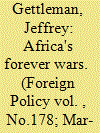

|
|
|
| 2 |
ID:
114714


|
|
|
| 3 |
ID:
091855
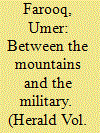

|
|
|
|
|
| Publication |
2009.
|
| Summary/Abstract |
For Mohammad Imran of Kani Garaan in South Waziristan the army's attitude towards the residents of his tribal agency has totally changed since it first launched an operation there. During the 2004 operation, the army's attitude towards local people was very friendly but harshness has replaced friendliness in the current operation.
|
|
|
|
|
|
|
|
|
|
|
|
|
|
|
|
| 4 |
ID:
107838
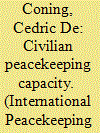

|
|
|
|
|
| Publication |
2011.
|
| Summary/Abstract |
The timely deployment of suitably qualified civilian personnel is a challenge that none of the organizations that deploy peacekeepers has yet addressed. This challenge has floundered on the periphery of the peacekeeping debate for many years, but a 2010-11 UN civilian capacity review provides a unique opportunity to focus attention on the problem. This article proposes the formation of a global civilian capacity partnership that brings together the training and roster community, the UN Secretariat and a grouping of interested states, with the aim of significantly improving the UN Secretariat's ability to identify, recruit and deploy suitably qualified civilian personnel in a reasonable time, and without adverse side effects for the local community or the mission mandate.
|
|
|
|
|
|
|
|
|
|
|
|
|
|
|
|
| 5 |
ID:
091995
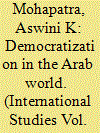

|
|
|
|
|
| Publication |
2008.
|
| Summary/Abstract |
The article argues that the Turkish experience with democracy may not affer a model for democratization of the Arab states in West Asia and North Africa.It begins with a brief account of institutional and political changes in Turkey since establishment of the modern Turkish Republic.It also explains how historical and structural conditions conducive to Turkey's progression to democracy are absent in much of the Arab world.
|
|
|
|
|
|
|
|
|
|
|
|
|
|
|
|
| 6 |
ID:
143286


|
|
|
|
|
| Summary/Abstract |
Problems associated with environment and climate change have long been in the headlines. However, research on the effects that such problems might have on civil–military relations has been limited so far. This article examines civil–military cooperation caused by environmental problems in the recent decades particularly in developing countries. It employs Pion-Berlin and Arceneaux’s theoretical framework on military missions and civilian control and then looks at the case of Botswana. This article argues that the recent decade has seen an increase in civil–military cooperation due to new security concerns over environmental problems.
|
|
|
|
|
|
|
|
|
|
|
|
|
|
|
|
| 7 |
ID:
154378


|
|
|
|
|
| Summary/Abstract |
This article aims to chronicle and analyse the transformation of the army of the Ethiopian People’s Revolutionary Democratic Front (EPRDF) into a national army following its military and political triumph in 1991. The history of a modern army in Ethiopia is recent, beginning with the end of the Second World War. Since then, the Ethiopian army has gone through major changes under different regimes. However, it is only the latest version of the national army that has a properly organised military doctrine and strategy. Prior to this, the army’s concept of operations was shaped by the doctrines and strategies of its foreign sponsors. The organisation of the imperial army was influenced by the doctrine and strategy of Western armies (initially the British and later the Americans); the army’s concept of operations during the military regime was shaped by Soviet senior military advisors. The EPRDF army was an insurgent army that developed into a conventional army with its own set of military and military–political institutions, including its own military doctrine and its own concept of the science and art of war. The transition of the EPRDF army into a national army is a unique example of restructuring a people’s army into a national military, something rarely if ever attempted with this kind of comprehensiveness.
|
|
|
|
|
|
|
|
|
|
|
|
|
|
|
|
| 8 |
ID:
113927


|
|
|
|
|
| Publication |
2012.
|
| Summary/Abstract |
Jiangsu was one of the many Chinese provinces that suffered from bitter and prolonged factional violence in 1967 and 1968. It took more than three years to recreate relatively stable government authority, and the process was protracted and highly contentious. A provisional cease-fire orchestrated by Beijing in September 1967 initiated six months of chaotic negotiations in Beijing, in which opposed civilian and military delegations proved immune to the Center's efforts to forge factional unity. The divisions continued to fester after the controversial General Xu Shiyou was put in charge of a new Provincial Revolutionary Committee in March 1968 that gave leading civilian rebels from neither faction significant posts. It took General Xu almost three years to eliminate his civilian and military opponents but, by the end of 1970, after a series of fierce suppression campaigns, he and his military allies ruled Jiangsu with an iron hand.
|
|
|
|
|
|
|
|
|
|
|
|
|
|
|
|
| 9 |
ID:
092312


|
|
|
|
|
| Publication |
2009.
|
| Summary/Abstract |
In the Post-Bipolar Era the growing complexity of the military operations requires a new approach for the resolution of international crises. Since the end of the Cold War, peace support operations (PSO) have become the mainstay and principal occupation of most Western armies. At the same time, Italy has been one of the most important actors in such an area. The article focuses on the cooperation between military and civil components (a process called CIMIC) as a key variable in the Italian PSOs. We will analyse in detail the main lessons learned from past military interventions as well as the general context in which new tendencies are taking place. The maintaining of a minimum security frame becomes essential to fulfil activities 'collateral' to the mission: reconstructing services and infrastructure, food distribution, water and medication, law and order, de-mining, training of local forces, and supporting local institutions. These are the main tasks to obtain thrust and support from the population.
|
|
|
|
|
|
|
|
|
|
|
|
|
|
|
|
| 10 |
ID:
091689
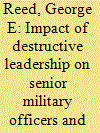

|
|
|
| 11 |
ID:
097042
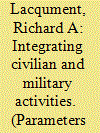

|
|
|
| 12 |
ID:
119428


|
|
|
|
|
| Publication |
2013.
|
| Summary/Abstract |
Intelligence may have a bright future. Advances in imagery and signals processing technology mean that intelligence agencies can deliver remarkably accurate and timely intelligence to civilian officials and military commanders. However much leaders gripe about intelligence, few are likely to disregard such fine-grained information about threats and opportunities, especially when national security is on the line. Others contend that intelligence is central to the kind of wars that the United States is likely to fight in the foreseeable future. Counterterrorism, for example, depends on intelligence agencies to provide detailed descriptions of terrorist organizations, warning of impending attacks, and precise targeting information for offensive actions. U.S. counterterrorism operations will persist long after the country draws down from Afghanistan, because of the geographic expansion of groups associated with al-Qaeda, and because of the growing enthusiasm for special operations forces (SOF) and unmanned aerial vehicle (UAV) strikes against them. 1 Most importantly, policymakers have invested lavishly in intelligence for over a decade. President George W. Bush called for a large increase in the intelligence personnel in the wake of the 11 September 2001 (9/11) attacks on New York City and Washington, DC. Later, Congress created the Office of the Director of National Intelligence (ODNI), adding a new layer of bureaucracy above an already sprawling constellation of agencies. And, despite a great deal of criticism, the budget for intelligence has more than doubled since 9/11 and continues to rise.
|
|
|
|
|
|
|
|
|
|
|
|
|
|
|
|
| 13 |
ID:
119137


|
|
|
| 14 |
ID:
144699


|
|
|
|
|
| Summary/Abstract |
This article attempts to explain the apparent failure of Nigeria's military action against the Boko Haram (roughly translated as ‘Western education is prohibited’) insurgency in the north-east of the country. Until the involvement of troops from Chad and Niger in January 2015, the Boko Haram insurgents were succeeding in their effort to establish, or rather consolidate, an extreme version of the ‘Islamic state’ in parts of north-east Nigeria. For over five years, the military struggled to defend the sovereignty and territorial integrity of Nigeria against Boko Haram, with little success. The war opened a Pandora's box, exposing a deep crisis in the military and the civilian leadership in Nigeria. The Boko Haram insurgents were able to fly the flag of their ‘state’ in the territory of Nigeria. This article argues that the failure of the military action can be attributed to three factors: the erosion of military professionalism under civilian administrations since 1999; the poor handling of the war by the top military officers; and a lack of decisiveness in the leadership of President Jonathan and the military to end the insurgency.
|
|
|
|
|
|
|
|
|
|
|
|
|
|
|
|
| 15 |
ID:
122601


|
|
|
|
|
| Publication |
2012.
|
| Summary/Abstract |
Since the adoption of an action plan at the Sea Island Summit in 2004, the Group of Eight (G8) has
addressed the issue of global peacekeeping capacity-building. This peacekeeping capacity-building
assistance agenda includes military, police and civilian aspects of peacekeeping, and aims at the
development of a comprehensive range of peacekeeping capabilities worldwide. The G8 initiatives
have produced some positive results for those nations receiving assistance. However, on the other
hand, the G8 members' actual assistance programs have placed an emphasis on the training of military
peacekeepers at the cost of some other areas, including logistic and financial assistance, which have
not received sufficient attention.
Unlike the United Nations (UN), the G8 is not an operational actor in peacekeeping. However,
from a diplomatic perspective, the G8, like the UN, is a global actor while being unique in that it has
a more flexible organizational structure and agenda-setting capacity. The G8 can play a significant
role in global peacekeeping by mobilizing and legitimizing international assistance to global actors
and governments engaged in peacekeeping as well as peacekeeping capacity-building. As a founding
member of the G8, Japan is expected to actively draw linkages with the G8's peacekeeping capacitybuilding agenda with its own peacekeeping policy and to take the initiative in further developing the
G8 agenda.
|
|
|
|
|
|
|
|
|
|
|
|
|
|
|
|
| 16 |
ID:
182674


|
|
|
|
|
| Summary/Abstract |
This article examines what scholars can learn about civilian killings from newswire data in situations of non-random missingness. It contributes to this understanding by offering a unique view of the data-generation process in the South Sudanese civil war. Drawing on 40 hours of interviews with 32 human rights advocates, humanitarian workers, and journalists who produce ACLED and UCDP-GED’s source data, the article illustrates how non-random missingness leads to biases of inconsistent magnitude and direction. The article finds that newswire data for contexts like South Sudan suffer from a self-fulfilling narrative bias, where journalists select stories and human rights investigators target incidents that conform to international views of what a conflict is about. This is compounded by the way agencies allocate resources to monitor specific locations and types of violence to fit strategic priorities. These biases have two implications: first, in the most volatile conflicts, point estimates about violence using newswire data may be impossible, and most claims of precision may be false; secondly, body counts reveal little if divorced from circumstance. The article presents a challenge to political methodologists by asking whether social scientists can build better cross-national fatality measures given the biases inherent in the data-generation process.
|
|
|
|
|
|
|
|
|
|
|
|
|
|
|
|
| 17 |
ID:
096445
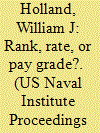

|
|
|
| 18 |
ID:
094063


|
|
|
|
|
| Publication |
2010.
|
| Summary/Abstract |
In his December RUSI address, the Chief of Defence Staff urged the re-examination of the UK's understanding of the strategic environment, the development of strategic thinkers within British institutions, and a sharper focus on strategic imperatives. This article continues the clarion call for the crafting of a new strategic 'grammar' across both military and civilian structures, in an attempt to reinvigorate the lessons of the great classical strategists.
|
|
|
|
|
|
|
|
|
|
|
|
|
|
|
|
| 19 |
ID:
184339


|
|
|
|
|
| Summary/Abstract |
The Egyptian–Israeli peace treaty marked a new era in the history of the Arab–Israeli conflict. Relying methodologically on the history of ideas and diplomatic history, this article sheds light on the diversity of the perceptions and receptions of peace and relations with Israel as manifested by two influential Egyptian public opinion shapers who represented polar approaches—the mouthpiece of the Muslim Brothers—the journal Al-Da‘wa and Rūz al-Yūsuf, the semi-independent liberal weekly with a moderate left bias. The timeframe is 1977–1982—from Sadat’s historical visit to Jerusalem to the Israeli invasion of Lebanon and its impact on the budding Israeli–Egyptian relations.
|
|
|
|
|
|
|
|
|
|
|
|
|
|
|
|
| 20 |
ID:
115721
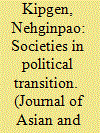

|
|
|
|
|
| Publication |
2012.
|
| Summary/Abstract |
This article explores the different patterns of political transitions under two military dictatorships in Southeast Asia. Burma and Indonesia were former colonies which gained independence from the British and the Netherlands in 1948 and 1945 respectively. General Ne Win ruled Burma for over two decades (1962-88) and General Suharto ruled Indonesia for over three decades (1967-98). The article examines why Burma remained a military dictatorship after the downfall of the Ne Win-led Burma Socialist Program Party (BSPP) government, while Indonesia transitioned to a democratic society with the collapse of the Suharto-led New Order government. The article argues that a lack of a unified and established civilian leadership, coupled with the army's reluctance to relinquish power, led to another military coup in Burma, whereas the military in Indonesia encouraged the emergence of a civilian government by establishing and strengthening bureaucracies.
|
|
|
|
|
|
|
|
|
|
|
|
|
|
|
|
|
|
|
|
|